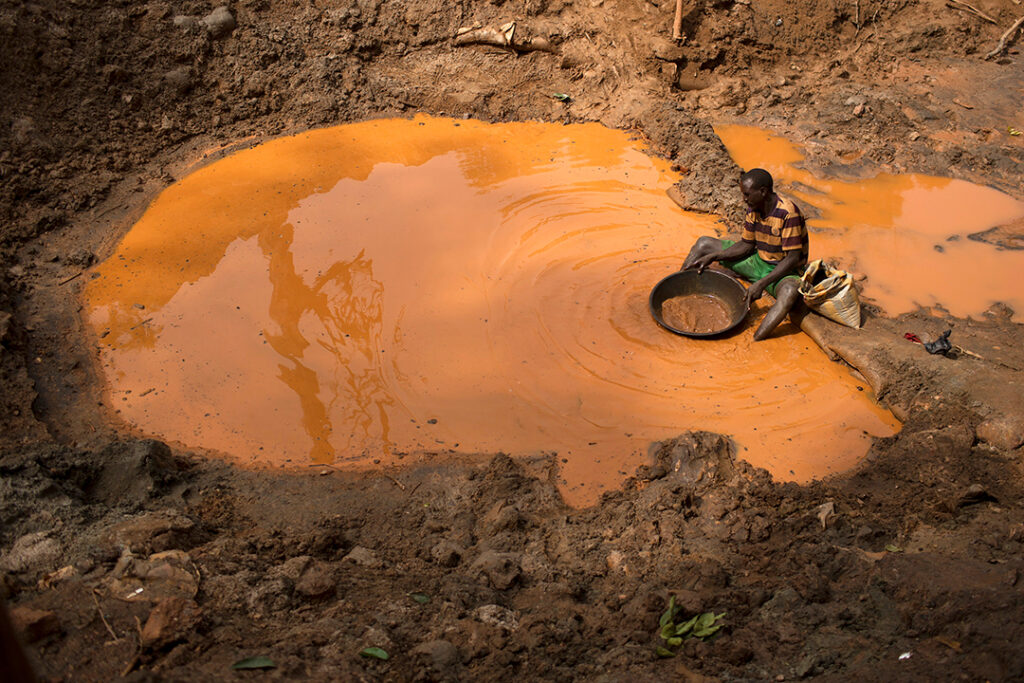ADF STAFF
Violent clashes between Russian mercenaries and civilians near gold mines in the Central African Republic (CAR) have been commonplace for years.
Following the invasion of Ukraine, Russia’s thirst for African gold appears even greater, and the death toll is rising.
“Sanctions on Russia are triggering its push for gold,” journalist Philip Obaji Jr. told ADF. “Even though Russia could find it difficult to sell its gold stash as a result of the sanctions, there’s still the physical market, where tracing can be difficult. It’s filled with loopholes, which they can exploit.”
Russian mercenaries killed hundreds of civilians in a string of attacks from March 14 to 18 in Ouandja, a gold-mining area of the CAR, according to interviews with survivors by news website Middle East Eye (MEE).
Gold miner Adam Zakaria, who left Sudan because of insecurity, said six members of his family were among more than 50 Sudanese people killed by Russian mercenaries in the attacks, which included heavily armed helicopters, tanks and trucks.
“What we saw was very brutal and bloody,” Zakaria told MEE. “They used these aggressive forces and weapons against the civilians, including slaughtering the traders and miners, as well looting the gold and money. [They] want to expel traditional miners so that they can control the gold mining areas in CAR and then in the entire Sahel region themselves.
“We lost hundreds of victims who fled the area as the Russian forces tracked the displaced people until they were close to the borders of Sudan.”
Since it arrived in the CAR in 2017, the Russian mercenary Wagner Group has focused on securing mining concessions and sites. It also has been accused of war crimes against civilians, including killings, torture, rape, forced displacements and indiscriminate targeting of civilian structures.
A 2021 report by the United Nations peacekeeping force in the CAR (MINUSCA) said Russians “may have committed war crimes, especially in executing civilians and other individuals who were not taking part in hostilities” in the central region of the country.
In a statement, the U.N. Working Group on Mercenaries said it was “deeply disturbed by the interconnected roles of Sewa Security Services, Russian-owned Lobaye Invest SARLU, and a Russian-based organization popularly known as the Wagner Group.”
Lobaye Invest is a mining company owned by Russian oligarch Yevgeny Prigozhin, a close ally of Putin.
“We’re seeing some of the most serious human rights violations and humanitarian law violations, and we’re seeing them on a widespread scale,” Sorcha MacLeod, a member of the U.N. working group, said in an interview with CNN. “People on the ground are absolutely terrified.”
Gold mines in the CAR and Sudan have been conflict zones years before the Russians deployed, but observers say recent levels of violence are unprecedented.
Feeling the squeeze of international sanctions, Russia has more reason to build its already substantial gold reserves.
“Russia has been building its influence in Africa since 2014, including with the governments of West African gold producers Mali and the Central African Republic,” the Global Initiative Against Transnational Organized Crime wrote in an April 2022 bulletin. “Russia’s warm relations with regional governments raises concerns that the gold sector could be an avenue to raise funds and launder gold to evade sanctions imposed against Moscow and other actors.”
Experts believe Russia uses the Wagner Group to target African nations rich in gold and diamond deposits to brace for sanctions after it invaded and annexed the Crimean Peninsula in 2014.
Conflict over gold in the border region between the CAR and Sudan has intensified since 2017, when former Sudanese president Omar al-Bashir allowed Russian companies to mine along the border.
“The Russians are expanding their influence in the region with many reports from eyewitnesses confirming that the company of Wagner is expelling the miners and seizing the entire area,” journalist Abdel Moneim Madbo told MEE. “The government in Sudan enabled the Russians to have a presence in the country, and the government in CAR has also enabled the Russians in order to help Bangui in its fighting against the rebel Seleka militia.”
Those efforts were undermined recently, when the Wagner Group reportedly withdrew hundreds of mercenaries from the CAR to deploy in Ukraine, leaving the mercenary group to carry on its operations in the CAR with newer recruits.
“Russia is in desperate need for battle-hardened fighters, so it is pulling experienced fighters to Ukraine and replacing them with people who are more or less learning on job,” Obaji said. “Whether that’s responsible for the recent massacre is hard to tell, because even the so-called experienced ones were involved in similar incidents in the past.”

